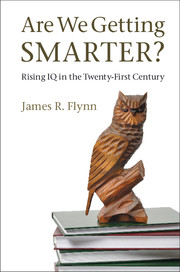Book contents
- Frontmatter
- Contents
- List of Figures
- List of Tables
- List of Boxes
- Acknowledgments
- 1 Opening windows
- 2 IQ and intelligence
- 3 Developing nations
- 4 Death, memory, and politics
- 5 Youth and age
- 6 Race and gender
- 7 The sociological imagination
- 8 Progress and puzzles
- Appendix I IQ trends
- Appendix II Capital cases and comparing the WAIS-III IQs of various nations
- Appendix III Adult/child IQ trends and bright taxes/bonuses
- Appendix IV Gender and Raven’s
- Appendix V Wonderful paper on causes of Raven’s gains
- References
- Subject index
- Name index
5 - Youth and age
Published online by Cambridge University Press: 05 November 2012
- Frontmatter
- Contents
- List of Figures
- List of Tables
- List of Boxes
- Acknowledgments
- 1 Opening windows
- 2 IQ and intelligence
- 3 Developing nations
- 4 Death, memory, and politics
- 5 Youth and age
- 6 Race and gender
- 7 The sociological imagination
- 8 Progress and puzzles
- Appendix I IQ trends
- Appendix II Capital cases and comparing the WAIS-III IQs of various nations
- Appendix III Adult/child IQ trends and bright taxes/bonuses
- Appendix IV Gender and Raven’s
- Appendix V Wonderful paper on causes of Raven’s gains
- References
- Subject index
- Name index
Summary
We return to our old companions the Wechsler subtests. At this point, puzzles begin to emerge. First, over the last half-century, have adults and their children progressively grown apart, rather like partners in a failed marriage who find it more and more difficult to speak the same language? Second, old age seems to levy a penalty on our analytic abilities that becomes more and more onerous the brighter we are. Do bright brains require a higher level of maintenance, one that old age cannot supply? Or does retirement reduce everyone’s mental exercise to the lowest common denominator? These speculations strike me as unwelcome if not bizarre, but I will rehearse the evidence that forced them upon me.
Vocabulary trends since 1950
Comparing WISC and WAIS trends reveals a growing gap between the active vocabularies of American adults and schoolchildren over the last half-century. In order to compare adults and children over the same periods, I averaged the beginning and ending dates of the WISC and WAIS periods. The only complication was posed by the final period of gains. Here the WISC gains represent 12.75 years and the WAIS gains only 11 years. Therefore, I multiplied WAIS gains by 12.75/11 to get values comparable to the WISC.
- Type
- Chapter
- Information
- Are We Getting Smarter?Rising IQ in the Twenty-First Century, pp. 98 - 131Publisher: Cambridge University PressPrint publication year: 2012



